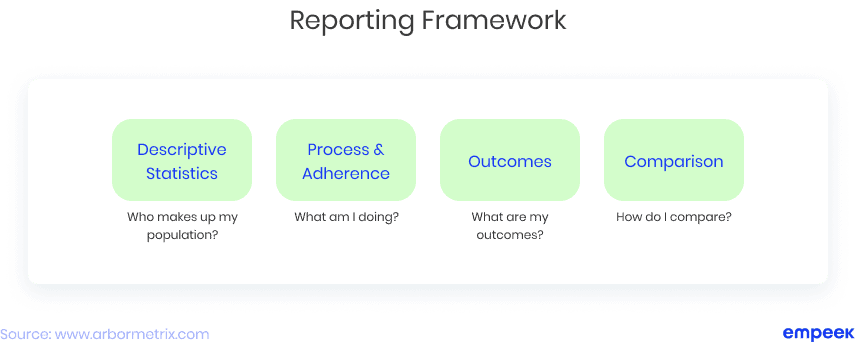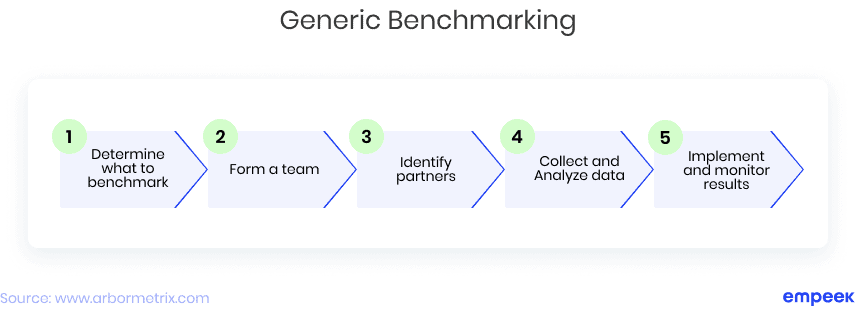Only those businesses which pay attention to competence and competitiveness win. In the field of healthcare, organizations can enhance their performance by adding competitive benchmarking. Did you know that benchmarking tools in healthcare improve the caseload’s manageability by 10% and shorten the wait time by 350%?
When using healthcare benchmarking tools, an individual chooses a subject and the area they want to measure while prioritizing the metrics. They later add the collected data on their organization and the competitors and let the tool analyze the performance.
When creating benchmarking software, pay attention to its type and functions. Check the article below to learn the types of benchmarking tools, their specifics, and difficulties associated with their development.
What Is Benchmarking in Healthcare and What Is the Role of Benchmarking Tools?
‘Benchmark’ is a ‘measure’ one sets in a compare-and-contrast process. Meanwhile, ‘benchmarking’ is a procedure that allows one to set standard measures and compare whether healthcare processes meet the set demands. One of the best benchmarking examples in healthcare is population descriptive statistics. By using benchmarking in healthcare organizations, the latter can identify their target audience, collect patient data, and improve their services.
Further, the tool identifies the activities associated with a particular group, for instance, the monthly number of online visits in adults. The next step implies the determination of outcomes for the organization. For example, the average number of online visits in adults in the next month. During the comparison stage of the benchmarking report, one may compare the monthly number of online visits in adults to the same subject but in adolescents or children.

In the end, the functions of healthcare benchmarking are:
- Improving organization’s performance;
- Enhancing patient safety and satisfaction with the company’s services;
- Increasing the quality of the medical services by collecting patient data;
- Detecting organization’s weak spots in the business context;
- Predicting the internal and external trends.
Different Types of Benchmarking Healthcare and Their Benefits
IT specialists divide benchmarking tools into 4 types depending on the data scale they process and the company’s evaluation goals. According to traditional knowledge, benchmarking can be internal, competitive, functional, and generic.
Internal Benchmarking Tools
If a company wants to improve outcomes based on processes and functions within the same organization, it would commonly use internal benchmarking in healthcare. This type can also collect data of the company’s subsidiaries located in numerous places. Nowadays, the use of benchmarking by a healthcare organization allows the
latter to define standards of excellence and develop a plan for the organization’s improvement. Further, the company can check its ability to meet the plan’s demands and suggest timely changes.
Competitive Benchmarking Tools
The second type of benchmarking in healthcare is also called external benchmarking. Сompetitive or external benchmarking in healthcare allows the organization to compare their performance, services, and costs to the ones of the competitors in the same area. Keep in mind that the users of your app should be able to add two and more organizations because collecting the data of one’s direct competitor might be challenging.
Have an innovative idea for a healthcare app? Get advice from Empeek professionals and let them help you develop an efficient product!
Functional Benchmarking Tools
Unlike internal and external tools which process the data in the boundaries of the same industry, functional benchmarking encompasses a few industries. Functional benchmarking is effective at measuring and contrasting operational statistics associated with healthcare activities.
Functional benchmarking tools allow the user to compare functional capabilities of the healthcare systems which are parts of different healthcare branches (for instance, dentistry and cardiology).
Empeek software developers are professionals with decades of expertise in process digitization services. A team of talented specialists, our company develops custom-tailored EHR/EMR, mHealth, and pharma solutions among others.
Generic Benchmarking Tools
This type of healthcare benchmarking explores processes happening in all industries. It encompasses the benchmarking data in healthcare and compares it to the statistics of industries that are not related to healthcare.
Generic benchmarking follows the same steps as any other benchmarking tool. However, this type is associated with the greatest innovation, since healthcare professionals can find overlapping tendencies in other industries and adapt them in healthcare.
Get a quick consultation from our professionals on how to make your dream app a reality!

Practical Examples of Benchmarking in Healthcare
Internal benchmarking focuses on the departments or branches of the same organization. For instance, the company might want to know which subsidiary is associated with the highest number of cardiology-related problems. Here, the subsidiary with the highest rates might need more cardiologists to perform cardiology services in time and alleviate the caseload.
Competitive benchmarking focuses on two or more organizations in the same industry. For instance, specialists might compare two healthcare organizations from different countries. They might investigate the efficiency of the companies’ clinical registries or the speed of the companies’ response to online questions from the patients. Also, by comparing the organizations’ apps and their functions, specialists can determine how to improve the particular company’s app.
Functional benchmarking focuses on organizations representing non-related industries. For instance, a dentistry clinic might decide to compare its medication adherence rates to the nearest cardiology clinic. Other features like wait time, caseloads, pricing and billing (if the data is generally available) can be measured and compared too.
Generic benchmarking explores the same subject or pattern which exists in all industries. Here, a practical example of benchmarking for a healthcare organization is when a healthcare center explores patient management in healthcare against guest management in the hospitality industry.
Successful Data Transformation With Healthcare Benchmarking
The importance of benchmarking in healthcare is huge only if one uses the tool smartly. For instance, one should be accurate when choosing the factors of benchmarking as the output is a direct result of the input.
How to make the benchmarking process beneficial to a healthcare organization?
- Explore the initial differences. Two organizations might focus on helping cancer patients. However, the first organization might emphasize critical care, while the second hospital will focus on cancer-related research. In the end, the differences will outweigh the similarities yet lead to biased results if benchmarked wrong;
- Consider demographics. The number of residents with heart or lung problems will differ in various states or even cities. The same goes about the older and younger residents. In this case, the difference can immensely affect the outcomes of the benchmarking analysis;
- What about the climate? Benchmarking the response time of Florida hospitals to ones in Alaska will give an astonishing difference. Obviously, the snowy weather makes the signal encounter more impediments to its destination in snowy Alaska than in sunny Florida;
- Benchmark the data to extract even more data. Learning that the first hospital’s check-ins are 3 minutes longer than registration in other hospitals in the area is not enough. Find the common characteristics of the patients with the longest check-ins. The same goes for other aspects. By defining the number of insured clients, you can learn their financial background yet perform financial benchmarking;
- Find partners. The benefits of benchmarking in healthcare are immeasurable (pun intended). For instance, a healthcare organization can benchmark against other organizations with advocacy groups. This ability is especially important if the organization focuses on research.
Before developing your own benchmarking app, check the tip from our Empeek experts in a guide to benchmarking healthcare below.Consider cutting-edge analytics a part of data business strategy. Cutting-edge analytics allows businesses to translate the data masses into
- well-detailed knowledge. This tool gathers the data and organizes it into patterns. Nonetheless, half of the gathered data remains semi-structured. Hence, it is important to think of enhanced data collection processing during the app development stage;
- Remember IoT when developing edge-analytics tools. Edge-analytics tools are especially important when it comes to the Internet of Things and medical devices. In the healthcare surroundings, an efficient software timely responds to sensors like in-hospital patient monitoring devices and successfully stores the gathered data;
- Focus on risk-adjusted benchmarking. Underestimating a competitor has done no good to any company. That’s why your benchmarking apps should detect any data changes associated with the company’s competitors in the area. Focus on the performance opportunity analysis and a scoring feature if you develop a competitive benchmarking tool;
- Make your quality benchmarking in healthcare efficient on various company levels. Make your product efficient for both administrators and clinicians. The latter can manage their professional performance and caseload. By changing benchmarks in compliance with recent protocols, clinicians can monitor and study their performance under the recently accepted rules;
- Don’t forget about AI! Making NLP a part of your app is essential for improved data structuring and further analysis. Think of artificial intelligence as an invisible brain that reads words and calculates numbers at a stunning speed. Now imagine a benchmarking app without this magic ingredient. Can this app process text and compose grammatically correct and stylistically coherent paragraphs? Obviously, no;
- Remember the aspects which healthcare organizations focus on while using a benchmarking tool. When it comes to analytics, top priorities for exploration are the number of online appointments, the statistics of online billing and payments, and other data regarding e-precribing, preregistration, and medical records access;
- Focus on process, strategy, and performance. These three components are crucial elements in your benchmarking tool. A healthcare organization should be able to compare its business processes to ones of the industry’s top performers. Meanwhile, a healthcare organization requires the analysis of its business strategy and the analysis of the HR or marketing team’s performance.
Consider Empeek Your Trusted Partner
Empeek is a modern team of specialists who provide affordable and effective custom-tailored solutions to medical startups and health organizations. Our expertise encompasses EHR and EMR development, healthcare IoT and CRM, and mHealth app development services. But this is not where our expertise ends. We can also assist you in pharma and telemedicine software development as well as software development for medical devices.
One of our projects with a benchmarking feature is a screening tool. It is used to investigate the social determinants of health (for instance, housing and employment) of Medicare and Medicaid patients. The main challenge was keeping all once paper-based records intact and ensuring the organization could share the data with other healthcare community organizations and governmental agencies.
The solution to our challenge was a development of a new electronic system that analyses the patient’s needs and informs the organization of required healthcare assistance. The software features reports and analytics and is available in English and Spanish.
Another challenging project was the development of a financial management system for a UK-based company that would be straightforward to navigate. The solution to the problem was the creation of Financial Client Portal with its desktop and mobile version. The app features a financial consulting panel and analyzes customer’s financial data by generating automatic reports.
Contact us for service consultation and test your brand new app idea!








